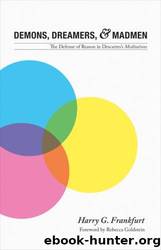Demons, Dreamers, and Madmen: The Defense of Reason in Descartes's Meditations by Frankfurt Harry G

Author:Frankfurt, Harry G. [Frankfurt, Harry G.]
Language: eng
Format: epub
Tags: Modern, History & Surveys, Philosophy, Movements, Rationalism
ISBN: 9780691134154
Google: 2CrXAAAAMAAJ
Amazon: 0691134154
Goodreads: 1501810
Publisher: Princeton University Press
Published: 1969-11-30T08:00:00+00:00
11
Sum res cogitans
It is clearly important for Descartes to establish that sum is certain, but doing so does not solve the fundamental epistemological problem he raised in the First Meditation. That problem was not to identify propositions more worthy of unreserved assent than the sensory beliefs in which his confidence had been undermined. It was to discover a rule of evidence more reliable than the rules of sensory evidence that his skeptical arguments discredited. Descartes does not propose a solution to this problem until the Third Meditation, when he formulates his principle of clear and distinct perception: âIt seems to me that I can establish as a general rule that everything I perceive very clearly and distinctly is true.â1
What is âclearâ and âdistinctâ perception? Descartes offers some useful explanations in Principles of Philosophy, a book in which he presents his doctrines in the synthetic mode.2 But he provides no very explicit or deliberate definitions of these terms in the Meditations; he introduces them there more or less informally, almost as though they were not technical terms at all. Presumably, since the Meditations is written in the analytic mode, he believes that readers who carefully reconstruct the development of his views can gather the meanings of the terms for themselves. It is 1 HR I, 158; AT VII, 35, ll. 13â15.
2 Principles I, xlv, xlvi; HR I, 237; AT VIII, 21â22.
Sum res cogitans 155
appropriate, therefore, to try to elucidate his notion of clear and distinct perception by considering how, in the Meditations, he derives the first knowledge that he characterizes as being clear and distinct.
Some commentators, particularly those who base their interpretation of Descartesâs philosophy largely on the Discourse on Method, suppose that he elicits the principle of clarity and distinctness by reflecting on the paradigmatic certainty of sum. Copleston, for example, gives the following account of the matter:
By examining a proposition which is recognized to be true and certain, he hopes to find a general criterion of certainty. And he comes to the conclusion that there is nothing in the proposition, I think, therefore I am, which assures him of its truth except that he sees very clearly and distinctly what is affirmed.3
Now this is quite accurate as far as what Descartes says in the Discourse is concerned, but it does not fit the procedure that he follows in the Meditations.
In both the Discourse and the Meditations, as a matter of fact, Descartes postpones introducing the principle of clarity and distinctness until he has gone beyond discovering that his existence is certain and has reached a conclusion concerning his nature. This in itself suggests that he may not think it possible to derive the principle simply from his initial certainty that he exists. In the Meditations (though not in the Discourse), moreover, he indicates rather clearly that reaching a conclusion beyond the belief that sum is certain is of decisive relevance in his derivation of the principle: 3 Frederick Copleston, A History of Philosophy, Vol. IV (Garden City: Doubleday, 1963), p.
Download
This site does not store any files on its server. We only index and link to content provided by other sites. Please contact the content providers to delete copyright contents if any and email us, we'll remove relevant links or contents immediately.
| Deconstruction | Existentialism |
| Humanism | Phenomenology |
| Pragmatism | Rationalism |
| Structuralism | Transcendentalism |
| Utilitarianism |
The remains of the day by Kazuo Ishiguro(8965)
Tools of Titans by Timothy Ferriss(8360)
Giovanni's Room by James Baldwin(7315)
The Black Swan by Nassim Nicholas Taleb(7097)
Inner Engineering: A Yogi's Guide to Joy by Sadhguru(6783)
The Way of Zen by Alan W. Watts(6590)
Asking the Right Questions: A Guide to Critical Thinking by M. Neil Browne & Stuart M. Keeley(5751)
The Power of Now: A Guide to Spiritual Enlightenment by Eckhart Tolle(5742)
The Six Wives Of Henry VIII (WOMEN IN HISTORY) by Fraser Antonia(5493)
Astrophysics for People in a Hurry by Neil DeGrasse Tyson(5172)
Housekeeping by Marilynne Robinson(4433)
12 Rules for Life by Jordan B. Peterson(4298)
Double Down (Diary of a Wimpy Kid Book 11) by Jeff Kinney(4257)
The Ethical Slut by Janet W. Hardy(4236)
Skin in the Game by Nassim Nicholas Taleb(4232)
Ikigai by Héctor García & Francesc Miralles(4229)
The Art of Happiness by The Dalai Lama(4120)
Skin in the Game: Hidden Asymmetries in Daily Life by Nassim Nicholas Taleb(3986)
Walking by Henry David Thoreau(3949)
